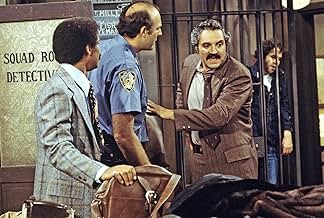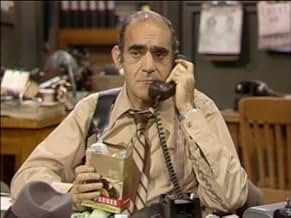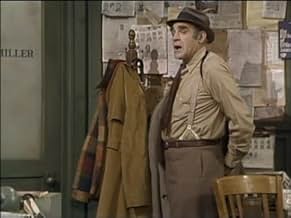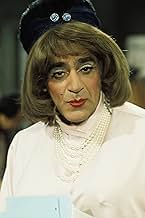Il capitano del dodicesimo distretto di polizia di New York e il suo staff gestiscono i vari problemi e i personaggi locali che entrano nei locali della squadra.Il capitano del dodicesimo distretto di polizia di New York e il suo staff gestiscono i vari problemi e i personaggi locali che entrano nei locali della squadra.Il capitano del dodicesimo distretto di polizia di New York e il suo staff gestiscono i vari problemi e i personaggi locali che entrano nei locali della squadra.
- Vincitore di 3 Primetime Emmy
- 9 vittorie e 43 candidature totali
Sfoglia gli episodi
Recensioni in evidenza
How come there are not more TV shows like Barny Miller? This was one of the best TV shows on TV. The writing and characters were fantastic and even though it has a 1970's feel and look to it, the show still packs a punch.
Barney Miller dealt with important topics as gay police officers and the fact that even though they are gay, they are still valuable members of society.
There are not really and funny shows anymore. What is a TV viewer suppose to watch? Friends?? Paris Hilton washing a cow. Please give me something!!!
Barney Miller dealt with important topics as gay police officers and the fact that even though they are gay, they are still valuable members of society.
There are not really and funny shows anymore. What is a TV viewer suppose to watch? Friends?? Paris Hilton washing a cow. Please give me something!!!
"Barney Miller" showed the gritty realism of police work in New York City in the 1970s, albeit with humor. Skits about the impending bankruptcy of the city, some of the futile criminal behavior (man stuck inside ductwork trying to burglarize a store), the mundane day in, day out existence of police officers with the occasional heart-pounding, adrenalin rush of excitement, and of course, what we in the profession called "the hairbags" - the old cops, forever full of stories, content to live in the past as Inspector Lugar exemplifies. To those who say "Barney Miller" is dated, I say the show is a timeless slice of life, and can be set in almost any locale and time period. The cast could not have been picked with any more brilliance, and the production was seamless. I say "Barney Miller" is a classic for the generations.
"Barney Miller" was a show that changed dramatically during the course of its run, despite the fact that its plot, setting, and basic cast remained the same.
The show dealt with a detective squad at a precinct house in New York City and the often strange people from the community who went in and out their door. At the beginning of the series, the pace was fast and the comedy a bit "loud," and the emphasis was on one-liners and quirkiness rather than on real characters. Barney was the captain of the precinct, very put-upon and overworked, but nevertheless always wise and friendly. Wojo was the well-meaning detective who was a bit lacking in smarts. Harris was funny, fashion-conscious, and cool, while Yemana was much more introverted, though he would also provide the occasional witty commentary. Fish was the old man on the verge of retirement who had more ailments than you could imagine. Chano was perhaps the most "normal" of the bunch after Barney, and always tried to have a positive outlook despite being constantly exposed to the less inspiring side of life.
The detectives were racially mixed, which, at the show's inception, would occasionally provide for some comedy, though ethnic humor was largely dispensed with after the first season. Other detectives came and went after an episode or two, especially during the very early years.
By the end of the run, the pace of the show had slowed down somewhat. The precinct house was now very leisurely for a police station in Manhattan. Conversations became more relaxed as well, and you got the idea that the directors were trying to show human interaction as it often was, with people thinking before they spoke. The dialog became wittier and the characterization much more subtle. Barney was now more of a real person, the pressures of life seemingly affecting him more, and he would even get a bit frustrated with his immediate underlings. Harris, with whom Barney now clashed from time to time, had become successful financially and was becoming more attuned to the cultural side of things. He had developed into something of a snob, and was also less and less interested in police work as the series went on. Chano had moved on early, Fish retired (and had briefly had his own show), and the actor who played Yemana died, inspiring a half-hour tribute to actor Jack Soo by the rest of the cast. Dietrich was Fish's replacement, and was the intellectual of the group (one Monday morning he chit-chatted about how he had gone to the Goethe Festival over the weekend). His (often in-depth) knowledge on every conceivable subject was an extreme nuisance to Harris, but proved helpful to Barney in official matters. Wojo, by the end of the run, was no longer the loud, sex-driven brute he had been before, but rather a soulful and sensitive person, prompting Harris, in one of the show's great inside jokes, to proclaim in the final episode: "He is so MUCH improved!"
Popping in occasionally was Inspector Luger, Barney's immediate superior, a man who yearned for the old days of police work, when men were men (and died like men) and there wasn't all this "concern" for the suspect. Though Luger never changed, Barney's reaction to him did: where he once considered him as an amusing relic from the past of the city's police force, he later saw him as dangerously out of touch and a potential threat to police-civilian relations. And he turned out to be just that: at a protest by Hasidic Jews at the station house, Luger suggested that they all disperse, go home and "take a shave." The protest immediately turned into a riot.
The obsequious Officer Carl Levitt became a regular after a few seasons, always trying to become a detective, but continually rejected, apparently because of his height. And every once in a while there was a visit from Lt. Scanlon of Internal Affairs, who delighted in the hunt and, especially, the smell of blood.
Almost all the action during the run of the show took place in the squad room (which contained a single jail cell) and Barney's adjoining office. Despite the fact that the squad seemed very small considering its location (not to mention not very busy!), the viewer got the feeling that he was really in a run-down precinct house. The office was cramped, and the furniture old and in dire need of replacement. Papers and files lay around for so long that you actually got used to them being where they were, and the advertisement for boxing posted on the wall next to the stairs seems never to have been updated in seven years.
"Barney Miller," during its run, became a literate, well-written show with interesting characters and story lines. In its later years it unfortunately suffered from "social-cause-of-the-week" syndrome, à la Lou Grant, but it also knew when it was taking itself just a little too seriously, and the episode would often allow a well-timed and witty remark by Dietrich to lighten the atmosphere a bit.
"Barney Miller" is highly recommended, especially in daily reruns, where you can see its steady development into a fine television series.
The show dealt with a detective squad at a precinct house in New York City and the often strange people from the community who went in and out their door. At the beginning of the series, the pace was fast and the comedy a bit "loud," and the emphasis was on one-liners and quirkiness rather than on real characters. Barney was the captain of the precinct, very put-upon and overworked, but nevertheless always wise and friendly. Wojo was the well-meaning detective who was a bit lacking in smarts. Harris was funny, fashion-conscious, and cool, while Yemana was much more introverted, though he would also provide the occasional witty commentary. Fish was the old man on the verge of retirement who had more ailments than you could imagine. Chano was perhaps the most "normal" of the bunch after Barney, and always tried to have a positive outlook despite being constantly exposed to the less inspiring side of life.
The detectives were racially mixed, which, at the show's inception, would occasionally provide for some comedy, though ethnic humor was largely dispensed with after the first season. Other detectives came and went after an episode or two, especially during the very early years.
By the end of the run, the pace of the show had slowed down somewhat. The precinct house was now very leisurely for a police station in Manhattan. Conversations became more relaxed as well, and you got the idea that the directors were trying to show human interaction as it often was, with people thinking before they spoke. The dialog became wittier and the characterization much more subtle. Barney was now more of a real person, the pressures of life seemingly affecting him more, and he would even get a bit frustrated with his immediate underlings. Harris, with whom Barney now clashed from time to time, had become successful financially and was becoming more attuned to the cultural side of things. He had developed into something of a snob, and was also less and less interested in police work as the series went on. Chano had moved on early, Fish retired (and had briefly had his own show), and the actor who played Yemana died, inspiring a half-hour tribute to actor Jack Soo by the rest of the cast. Dietrich was Fish's replacement, and was the intellectual of the group (one Monday morning he chit-chatted about how he had gone to the Goethe Festival over the weekend). His (often in-depth) knowledge on every conceivable subject was an extreme nuisance to Harris, but proved helpful to Barney in official matters. Wojo, by the end of the run, was no longer the loud, sex-driven brute he had been before, but rather a soulful and sensitive person, prompting Harris, in one of the show's great inside jokes, to proclaim in the final episode: "He is so MUCH improved!"
Popping in occasionally was Inspector Luger, Barney's immediate superior, a man who yearned for the old days of police work, when men were men (and died like men) and there wasn't all this "concern" for the suspect. Though Luger never changed, Barney's reaction to him did: where he once considered him as an amusing relic from the past of the city's police force, he later saw him as dangerously out of touch and a potential threat to police-civilian relations. And he turned out to be just that: at a protest by Hasidic Jews at the station house, Luger suggested that they all disperse, go home and "take a shave." The protest immediately turned into a riot.
The obsequious Officer Carl Levitt became a regular after a few seasons, always trying to become a detective, but continually rejected, apparently because of his height. And every once in a while there was a visit from Lt. Scanlon of Internal Affairs, who delighted in the hunt and, especially, the smell of blood.
Almost all the action during the run of the show took place in the squad room (which contained a single jail cell) and Barney's adjoining office. Despite the fact that the squad seemed very small considering its location (not to mention not very busy!), the viewer got the feeling that he was really in a run-down precinct house. The office was cramped, and the furniture old and in dire need of replacement. Papers and files lay around for so long that you actually got used to them being where they were, and the advertisement for boxing posted on the wall next to the stairs seems never to have been updated in seven years.
"Barney Miller," during its run, became a literate, well-written show with interesting characters and story lines. In its later years it unfortunately suffered from "social-cause-of-the-week" syndrome, à la Lou Grant, but it also knew when it was taking itself just a little too seriously, and the episode would often allow a well-timed and witty remark by Dietrich to lighten the atmosphere a bit.
"Barney Miller" is highly recommended, especially in daily reruns, where you can see its steady development into a fine television series.
This show was one of the funniest in the history of television. The various characters that came in and out of the station made this show what it was. I really think the show was at its peak during the period when Abe Vigoda, Jack Soo and Steve Landesberg were all on the show together. However, once Vigoda and Soo were gone, the show seemed to shift to a more dramatic direction. This was especially evident in the memorial episode for Jack Soo. However, this was a highly influential show and if you look at Night Court, which was produced by pretty much the same team as this one, you will see some of the same qualities on that show that made this one great.
This is one of the absolute greatest shows on television - never fails to entertain. Too bad the "suits" didn't catch on and try to copy what so obviously worked. It ranks right there with M*A*S*H, Frasier, Cheers, and Married...With Children as examples of how good comedy can be...
Lo sapevi?
- QuizDuring its broadcast run, amid the many cop shows on television at the time, many real-life police officers considered this the show that best depicted the realities of police life.
- BlooperDetective Fish has inconsistent years of service with the department. In the season one episode "The Arsonist " he mentions being on the force for 25 years. In the same seasons episode "Fish" he remarks that he went to the academy in 1937, making him a 38 year veteran.
- Citazioni
Yemana: Then Fish runs in the alley and he leaps over us like one of those, what do you call those things in Africa that run and leap in the air?
Detective Ron Harris: Slaves.
- Curiosità sui creditiAt different times in the production of the series Max Gail was credited as both Max Gail and Maxwell Gail.
- ConnessioniFeatured in The 28th Annual Primetime Emmy Awards (1976)
I più visti
Accedi per valutare e creare un elenco di titoli salvati per ottenere consigli personalizzati
- How many seasons does Barney Miller have?Powered by Alexa
Dettagli
- Data di uscita
- Paese di origine
- Lingua
- Celebre anche come
- The Life and Times of Captain Barney Miller
- Luoghi delle riprese
- Azienda produttrice
- Vedi altri crediti dell’azienda su IMDbPro
- Tempo di esecuzione
- 30min
- Colore
Contribuisci a questa pagina
Suggerisci una modifica o aggiungi i contenuti mancanti








































